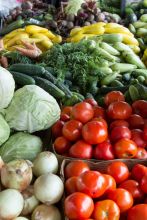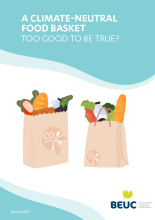
Latest News
Logo
Available in
English
This report details whether consumers in 11 European countries recognise symbols on food containers, understand them, and whether they for instance reuse a scratched frying pan or cracked ceramic container.
Available in
English
The Consumer Package published today by the European Commission will seek to better protect consumers from rampant greenwashing and give them new rights to use their products longer.
Available in
English
In light of the findings to be released today by the Intergovernmental Panel on Climate Change that changes to our diets can substantially slash greenhouse gas emissions, a coalition of EU-wide organisations is calling for better ‘food environments’ in the EU.
Available in
English
Misleading ‘carbon neutral’ claims are rife in the food sector and confuse consumers, as shown in a snapshot of examples published today by consumer groups from ten countries. BEUC is calling on the EU to ban the use of carbon neutral claims for all products including food and drink, while both the European Commission and Parliament are due to tackle greenwashing in the coming weeks.
Available in
English
Europe is undergoing a ‘perfect storm’: the rising energy prices, only partly linked to the Russian invasion of Ukraine, and its implications on other sectors (food, chemicals, pharmaceuticals, products, and services linked to energy-intensive production) led to heavy inflation. While salaries remain in most countries stable, prices are skyrocketing and supply chains are being disrupted, generating among many consumers major worries about their short-term future.
Therefore, it is crucial to identify and roll out measures to address or mitigate the effects of the cost-of-living crisis for consumers. These measures call for action by different stakeholders, be they market players or policy makers. They also have different timelines and need to be targeted depending on the specific needs of certain population segments
Therefore, it is crucial to identify and roll out measures to address or mitigate the effects of the cost-of-living crisis for consumers. These measures call for action by different stakeholders, be they market players or policy makers. They also have different timelines and need to be targeted depending on the specific needs of certain population segments
Available in
English
280+ organisations urge Commission President to stick to Sustainable Food System Law timeline
Political resistance against sustainable food policies is threatening to derail the process for an EU Sustainable Food Systems Law. Against this backdrop, together with more than 280 organisations, BEUC has signed an open letter urging European Commission President Ursula von der Leyen to ensure the Commission proposal is presented by September 2023, as planned.
Political resistance against sustainable food policies is threatening to derail the process for an EU Sustainable Food Systems Law. Against this backdrop, together with more than 280 organisations, BEUC has signed an open letter urging European Commission President Ursula von der Leyen to ensure the Commission proposal is presented by September 2023, as planned.
Available in
English
Available in
English







